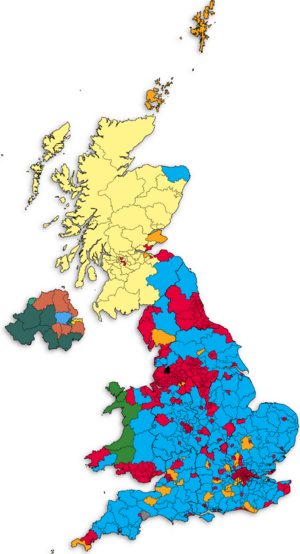2022 United Kingdom general election: Difference between revisions
No edit summary |
No edit summary |
||
| Line 97: | Line 97: | ||
The '''2022 United Kingdom general election''' was held on Thursday, 14 July 2022 to elect members to the {{wp|House of Commons}}. The governing {{wp|Conservative Party (UK)|Conservative Party}}, having previously enjoyed an uninterrupted twelve-year-long reign in power was defeated by a coalition consisting of the {{wp|Labour Party (UK)|Labour Party}}, the {{wp|Liberal Democrats (UK)|Liberal Democrats}}, and the [[Hanoverian Union Party]], which had previously been in a coalition with the {{wp|Conservative Party (UK)|Conservative Party}} before withdrawing from it in June 2022. In the end, neither party was able to achieve a majority of seats in the {{wp|House of Commons}}, although the tripartite coalition allowed the {{wp|Labour Party (UK)|Labour Party}} to lead a coalition government with the {{wp|Liberal Democrats (UK)|Liberal Democrats}} being a junior partner, while the [[Hanoverian Union Party]], despite also being a member of the coalition, opted to take a largely non-active role as it had done for decades prior. | The '''2022 United Kingdom general election''' was held on Thursday, 14 July 2022 to elect members to the {{wp|House of Commons}}. The governing {{wp|Conservative Party (UK)|Conservative Party}}, having previously enjoyed an uninterrupted twelve-year-long reign in power was defeated by a coalition consisting of the {{wp|Labour Party (UK)|Labour Party}}, the {{wp|Liberal Democrats (UK)|Liberal Democrats}}, and the [[Hanoverian Union Party]], which had previously been in a coalition with the {{wp|Conservative Party (UK)|Conservative Party}} before withdrawing from it in June 2022. In the end, neither party was able to achieve a majority of seats in the {{wp|House of Commons}}, although the tripartite coalition allowed the {{wp|Labour Party (UK)|Labour Party}} to lead a coalition government with the {{wp|Liberal Democrats (UK)|Liberal Democrats}} being a junior partner, while the [[Hanoverian Union Party]], despite also being a member of the coalition, opted to take a largely non-active role as it had done for decades prior. | ||
In the days leading up to the election, multiple scandals plaguing the {{wp|Conservative Party (UK)|Conservative Party}} led pollsters to speculate on either a {{wp|Labour Party (UK)|Labour}} majority victory or a {{wp|Labour Party (UK)|Labour}} minority victory, both of which were hotly debated among both pollsters and the general public. Nonetheless, pollsters were unanimous in showing a firm but tiny lead for {{wp|Labour Party (UK)|Labour}} against the {{wp|Conservative Party (UK)|Conservatives}}. In any case, on June 10th 2022, the leaders of the {{wp|Labour Party (UK)|Labour Party}}, the {{wp|Liberal Democrats (UK)|Liberal Democrats}}, and the [[Hanoverian Union Party]] jointly agreed to form a tripartite coalition, with the expectation that should {{wp|Labour Party (UK)|Labour}} fail to achieve a majority of seats in the {{wp|House of Commons}}, the total amount of seats combined from all three parties would prove enough to form a majority coalition government in the lower house. | In the days leading up to the election, multiple scandals plaguing the {{wp|Conservative Party (UK)|Conservative Party}} led pollsters to speculate on either a {{wp|Labour Party (UK)|Labour}} majority victory or a {{wp|Labour Party (UK)|Labour}} minority victory, both of which were hotly debated among both pollsters and the general public. Nonetheless, pollsters were unanimous in showing a firm but tiny lead for {{wp|Labour Party (UK)|Labour}} against the {{wp|Conservative Party (UK)|Conservatives}}. In any case, on June 10th 2022, the leaders of the {{wp|Labour Party (UK)|Labour Party}}, the {{wp|Liberal Democrats (UK)|Liberal Democrats}}, and the [[Hanoverian Union Party]] jointly agreed to form a tripartite coalition, with the expectation that should {{wp|Labour Party (UK)|Labour}} fail to achieve a majority of seats in the {{wp|House of Commons}}, the total amount of seats combined from all three parties would prove enough to form a majority coalition government in the lower house. In the meantime, the leaders of all three parties jointly campaigned on a promise to "effectively reverse the many errors of the downright shameful {{wp|Conservative Party (UK)|Conservative}} government", while {{wp|Patrick McLoughlin|McLoughlin}} himself campaigned on the premise of a "fresh start" under a new {{wp|Conservative Party (UK)|Conservative}} administration, one which would supposedly differ from the previously scandalous and widely unpopular {{wp|David Cameron}} administration. | ||
On Election Day, the {{wp|Labour Party (UK)|Labour Party}} won a total of 284 seats, their best record to date since {{wp|2005 United Kingdom general election|2005}}, while the {{wp|Conservative Party (UK)|Conservatives}} retained only 225 seats, having lost 166 seats of theirs in the election. On the other hand, all three parties, namely the {{wp|Scottish National Party}}, the {{wp|Liberal Democrats (UK)|Liberal Democrats}}, and the [[Hanoverian Union Party]] together saw an increase in their respective share of seats, with the {{wp|Scottish National Party|SNP}} making a total net gain of 7 seats, while the {{wp|Liberal Democrats (UK)|Liberal Democrats}} were able to considerably expand their share of seats with a gain of 26 seats in total, thereby bringing their total share from 8 to 34 seats. Meanwhile, the [[Hanoverian Union Party]] only gained one seat only (while also possessing the second largest swing in popular votes among all five parties), that being a {{wp|Conservative Party (UK)|Conservative}} seat in {{wp|Kingdom of Hanover|Hanover}}, which the party has traditionally dominated for nearly a century. | On Election Day, the {{wp|Labour Party (UK)|Labour Party}} won a total of 284 seats, their best record to date since {{wp|2005 United Kingdom general election|2005}}, while the {{wp|Conservative Party (UK)|Conservatives}} retained only 225 seats, having lost 166 seats of theirs in the election. On the other hand, all three parties, namely the {{wp|Scottish National Party}}, the {{wp|Liberal Democrats (UK)|Liberal Democrats}}, and the [[Hanoverian Union Party]] together saw an increase in their respective share of seats, with the {{wp|Scottish National Party|SNP}} making a total net gain of 7 seats, while the {{wp|Liberal Democrats (UK)|Liberal Democrats}} were able to considerably expand their share of seats with a gain of 26 seats in total, thereby bringing their total share from 8 to 34 seats. Meanwhile, the [[Hanoverian Union Party]] only gained one seat only (while also possessing the second largest swing in popular votes among all five parties), that being a {{wp|Conservative Party (UK)|Conservative}} seat in {{wp|Kingdom of Hanover|Hanover}}, which the party has traditionally dominated for nearly a century. | ||
Consequently, Prime Minister {{wp|Patrick McLoughlin}}, whom has been in power for only thirty-eight days in total, promptly resigned, and was promptly succeeded in his post by {{wp|Labour Party (UK)|Labour}} leader, {{wp|Keir Starmer}}, while {{wp|Liberal Democrats (UK)|Liberal Democrats}} leader, {{wp|Ed Davey}} succeeded his {{wp|Conservative Party (UK)|Conservative}} predecessor, {{wp|Philip Hammond}} as deputy prime minister, becoming the second to do so from his party after {{wp|Nick Clegg}}, whom served as deputy to then-{{wp|Conservative Party (UK)|Conservative}} leader, {{wp|David Cameron}} from 2010 to 2015. | Consequently, Prime Minister {{wp|Patrick McLoughlin}}, whom has been in power for only thirty-eight days in total, promptly resigned, and was promptly succeeded in his post by {{wp|Labour Party (UK)|Labour}} leader, {{wp|Keir Starmer}}, while {{wp|Liberal Democrats (UK)|Liberal Democrats}} leader, {{wp|Ed Davey}} succeeded his {{wp|Conservative Party (UK)|Conservative}} predecessor, {{wp|Philip Hammond}} as deputy prime minister, becoming the second to do so from his party after {{wp|Nick Clegg}}, whom served as deputy to then-{{wp|Conservative Party (UK)|Conservative}} leader, {{wp|David Cameron}} from 2010 to 2015. | ||
Revision as of 17:29, 21 July 2022
| ||||||||||||||||||||||||||||||||||||||||||||||||||||||||||||||||||||||||||||||||||
All 682 seats in the House of Commons 341 seats needed for a majority | ||||||||||||||||||||||||||||||||||||||||||||||||||||||||||||||||||||||||||||||||||
|---|---|---|---|---|---|---|---|---|---|---|---|---|---|---|---|---|---|---|---|---|---|---|---|---|---|---|---|---|---|---|---|---|---|---|---|---|---|---|---|---|---|---|---|---|---|---|---|---|---|---|---|---|---|---|---|---|---|---|---|---|---|---|---|---|---|---|---|---|---|---|---|---|---|---|---|---|---|---|---|---|---|---|
| Opinion polls | ||||||||||||||||||||||||||||||||||||||||||||||||||||||||||||||||||||||||||||||||||
| Registered | 48,636,047 | |||||||||||||||||||||||||||||||||||||||||||||||||||||||||||||||||||||||||||||||||
| Turnout | 69.9% ( | |||||||||||||||||||||||||||||||||||||||||||||||||||||||||||||||||||||||||||||||||
| ||||||||||||||||||||||||||||||||||||||||||||||||||||||||||||||||||||||||||||||||||
 A map presenting the results of the election, by party of the MP elected from each constituency. | ||||||||||||||||||||||||||||||||||||||||||||||||||||||||||||||||||||||||||||||||||
 Composition of the House of Commons after the election | ||||||||||||||||||||||||||||||||||||||||||||||||||||||||||||||||||||||||||||||||||
| ||||||||||||||||||||||||||||||||||||||||||||||||||||||||||||||||||||||||||||||||||
The 2022 United Kingdom general election was held on Thursday, 14 July 2022 to elect members to the House of Commons. The governing Conservative Party, having previously enjoyed an uninterrupted twelve-year-long reign in power was defeated by a coalition consisting of the Labour Party, the Liberal Democrats, and the Hanoverian Union Party, which had previously been in a coalition with the Conservative Party before withdrawing from it in June 2022. In the end, neither party was able to achieve a majority of seats in the House of Commons, although the tripartite coalition allowed the Labour Party to lead a coalition government with the Liberal Democrats being a junior partner, while the Hanoverian Union Party, despite also being a member of the coalition, opted to take a largely non-active role as it had done for decades prior.
In the days leading up to the election, multiple scandals plaguing the Conservative Party led pollsters to speculate on either a Labour majority victory or a Labour minority victory, both of which were hotly debated among both pollsters and the general public. Nonetheless, pollsters were unanimous in showing a firm but tiny lead for Labour against the Conservatives. In any case, on June 10th 2022, the leaders of the Labour Party, the Liberal Democrats, and the Hanoverian Union Party jointly agreed to form a tripartite coalition, with the expectation that should Labour fail to achieve a majority of seats in the House of Commons, the total amount of seats combined from all three parties would prove enough to form a majority coalition government in the lower house. In the meantime, the leaders of all three parties jointly campaigned on a promise to "effectively reverse the many errors of the downright shameful Conservative government", while McLoughlin himself campaigned on the premise of a "fresh start" under a new Conservative administration, one which would supposedly differ from the previously scandalous and widely unpopular David Cameron administration.
On Election Day, the Labour Party won a total of 284 seats, their best record to date since 2005, while the Conservatives retained only 225 seats, having lost 166 seats of theirs in the election. On the other hand, all three parties, namely the Scottish National Party, the Liberal Democrats, and the Hanoverian Union Party together saw an increase in their respective share of seats, with the SNP making a total net gain of 7 seats, while the Liberal Democrats were able to considerably expand their share of seats with a gain of 26 seats in total, thereby bringing their total share from 8 to 34 seats. Meanwhile, the Hanoverian Union Party only gained one seat only (while also possessing the second largest swing in popular votes among all five parties), that being a Conservative seat in Hanover, which the party has traditionally dominated for nearly a century.
Consequently, Prime Minister Patrick McLoughlin, whom has been in power for only thirty-eight days in total, promptly resigned, and was promptly succeeded in his post by Labour leader, Keir Starmer, while Liberal Democrats leader, Ed Davey succeeded his Conservative predecessor, Philip Hammond as deputy prime minister, becoming the second to do so from his party after Nick Clegg, whom served as deputy to then-Conservative leader, David Cameron from 2010 to 2015.




